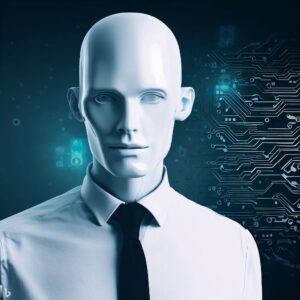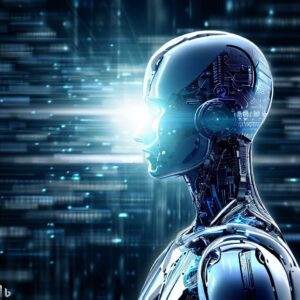The issue of “Will Artificial Intelligence Replace Humans?” frequently comes up in the rapidly changing technology environment of today. The revolutionary potential of AI and its possible effects on various facets of our life are at the center of this investigation.
In a time when technology is progressing quickly, people are wondering if artificial intelligence (AI) will eventually take over and replace humans. This subject has caused many arguments, conversations, and guesses across different fields. As experts in SEO and writing, we thoroughly look into this topic to give you a detailed understanding of the possibilities, challenges, and potential outcomes of AI becoming better than humans.
The Current Landscape
Understanding the state of artificial intelligence now is crucial before exploring its depths and the possibility that it could eventually replace people. The goal of AI, a subfield of computer science, is to develop machines that can carry out operations that ordinarily demand the human intellect. These challenges include a wide range of functions, including decision-making, voice recognition, and problem-solving.
The Progress of AI
AI systems have accomplished impressive accomplishments as a result of developments in machine learning, neural networks, and deep learning algorithms. These include outplaying human champions in challenging games like chess and go, making highly accurate medical diagnoses, and even writing music and producing artwork. Virtual assistants with AI capabilities, like Siri and Alexa, have ingrained themselves into our daily lives.
The Threat to Human Jobs
One of the primary concerns surrounding the rise of AI is the potential threat it poses to human employment. Automation powered by AI and robotics has already led to job displacement in certain industries. For instance, manufacturing and logistics have witnessed a shift towards automated processes, reducing the need for human workers. This trend raises questions about the future job market and the need for reskilling and upskilling.
The Promise of AI
On the other hand, AI opens up a universe of possibilities. It can revolutionize sectors like healthcare, banking, and transportation while increasing efficiency and enabling data-driven decision-making. The goal of AI-driven advancements in healthcare, autonomous driving, and financial analysis is to better people’s lives and advance society.
The Limitations of AI
- Lack of Common Sense: Although AI is capable of amazing feats, it frequently lacks common sense. Because AI systems rely on patterns and data to function, they are prone to making conclusions that make sense in a limited context but are absurd when seen from a wider, human perspective.
- Absence of Creativity: A uniquely human quality, creativity encompasses imagination, ingenuity, and thinking beyond the box. Contrarily, as AI is dependent on pre-existing data and methods, it might be difficult to come up with really original ideas for works of art, music, or other types of problem-solving.
- Emotional Intelligence: AI lacks emotional intelligence, empathy, and the ability to understand and respond to human emotions. This limitation is particularly evident in fields that require a deep understanding of human feelings, such as therapy, counseling, or customer service.
- Dependence on Data: AI is incapable of empathetic understanding, emotional intelligence, or reacting to human emotions. This shortcoming is especially noticeable in professions like therapy, counseling, or customer service which need a thorough comprehension of human emotions.
- Lack of Contextual Understanding: AI often struggles with understanding context, sarcasm, and the subtleties of human communication. This limitation can result in misinterpretation and errors when processing natural language, leading to unintended outcomes.
- Ethical and Moral Dilemmas: AI systems do not possess a moral compass or ethical framework. They make decisions based on algorithms and data, which can lead to ethical dilemmas in situations where human judgment, empathy, and ethical considerations are necessary.
- Ongoing Supervision: The majority of AI systems need ongoing maintenance and monitoring. They lack the self-awareness to recognize their mistakes or worsening performance, needing human assistance for maintenance and improvement.
- Energy Consumption: Numerous AI models are resource-intensive and demand a lot of processing power. This high energy use may have negative effects on the environment, increasing carbon emissions and the carbon footprint of AI systems.
- Security Concerns: AI systems are susceptible to manipulation and hacks. As they become more integrated into crucial infrastructure and decision-making processes, ensuring their security becomes crucial.
- Legal and Liability Issues: Determining liability in cases where AI systems make decisions with significant consequences can be legally complex. The legal framework around AI’s accountability and responsibility is still evolving.
These limitations highlight the need for careful consideration and responsible deployment of AI technologies. While AI continues to advance and offer transformative capabilities, it is essential to recognize its boundaries and actively address the ethical, societal, and technical challenges it presents.
The Human Element
Humans are different from AI in a number of ways, including our emotional intelligence, empathy, and creativity. These traits are entrenched in us profoundly and are essential in a variety of occupations, from artists who express their individual viewpoints to healthcare professionals who provide emotional support. It is still to be seen if AI will ever be able to mimic the complex nuances of human emotion and creativity.
The Coexistence of AI and Humans
A more positive attitude is to regard AI as a tool that may enhance and complement human talents rather than as a danger to mankind. AI can perform data-intensive and repetitive duties at work, freeing up workers to concentrate on interpersonal, creative, and strategic parts of their employment. Our capacity to intelligently harness AI’s potential will determine how well it is incorporated into various industries.
The Future of AI-Human Collaboration
As AI continues to advance, the future lies in harmonious collaboration between humans and machines. This synergy can unlock unparalleled possibilities. Imagine doctors utilizing AI for precise diagnoses while providing compassionate patient care, or educators using AI to personalize learning experiences while nurturing students’ creativity.
The goal of AI development services, a subfield of computer science, is to develop machines that can carry out operations that ordinarily demand the human intellect.
Will Artificial Intelligence Replace Humans?
Therefore, the answer to “Will Artificial Intelligence Replace Humans?” is a nuanced one. AI and humans are poised to coexist and collaborate, each contributing their unique strengths to the advancement of society. As AI continues to evolve, its role will primarily be to assist us, making our lives more efficient and allowing us to focus on tasks that require our human touch.
Conclusion
In conclusion, it is a complicated and multidimensional subject as to whether artificial intelligence will eventually supplant humans. Although AI has advanced significantly and presents difficulties for some work areas, it does not directly threaten mankind as a whole. Instead, it provides the possibility of cohabitation and collaboration, in which humans and AI cooperate to solve challenging issues and improve our quality of life.
Exciting opportunities exist for integrating AI into several facets of our life in the future. We must accept AI as a tool for advancement and make sure that it complies with our values and ethical standards if we are to effectively navigate this future. In order to coexist, learn from one another, and jointly create a better future, humans and AI must go on a common journey.

